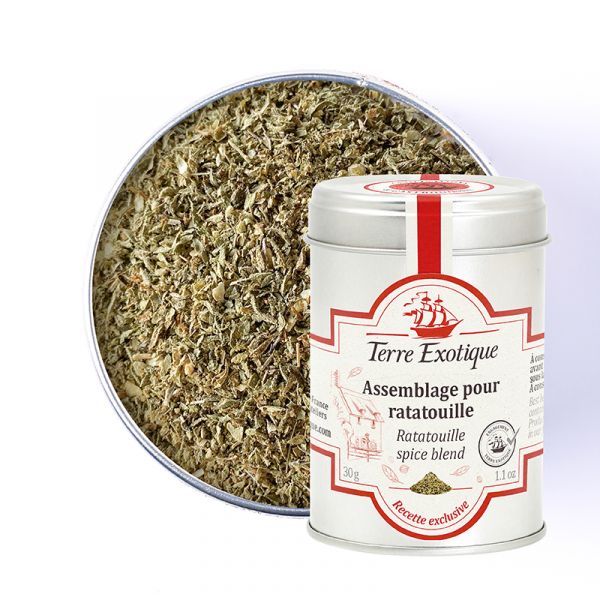
Which dishes to use the ratatouille blend in?
While it's clear that this blend will elevate your vegetable stir-fries and stews, it also pairs perfectly with your soups, stuffed tomatoes, and vegetable pies.
Some suggestions for using the ratatouille blend
Ratatouille: Add a spoonful of the mix to your vegetable stew and you're done! Tomatoes and vegetables stuffed with ratatouille blend: sprinkle a pinch of the mix in and on your stuffed tomatoes and other vegetables. Vegetable pies: put a spoon of the mix on your preparation to flavor your pie.
Herbaceous and citrus aromas, an ode to the Mediterranean
The ratatouille blend has delicious and subtle notes of Provence herbs, slightly peppery, and citrus fruits. This mix, combining softness and warmth, will enchant your taste buds and season your vegetable dishes with a touch of originality.
The ratatouille blend
What spices make up the ratatouille blend?
The ratatouille blend is a delicate mix of savory, basil, kaffir lime, garlic, coriander, and cumin.
Kaffir lime, the touch of character
The kaffir lime or cumbava is native to Indonesia, in the Sunda Islands archipelago. It was introduced by Pierre Poivre at the end of the 18th century in the Indian Ocean. Its name comes from the island it originates from: Sumbava. It was only in the 19th century that kaffir lime was introduced to Europe. Now, kaffir lime is known to the general public and is a prized ingredient of top chefs. Kaffir lime seduces with its intense and refreshing scent, revealing aromas of lime, verbena, and cinnamon.
A bit of history
The origins of ratatouille
Ratatouille is a traditional French dish from the Provence region. Created in the 18th century, this mix of simmered vegetables, including tomatoes, eggplants, zucchinis, and bell peppers, has become emblematic of Mediterranean cuisine. Over the centuries, the recipe has evolved to become a symbol of simplicity and flavor. Today, ratatouille is appreciated worldwide for its deliciously fragrant taste and its French culinary heritage. In 2007, the animated film "Ratatouille" elevated the recipe to gourmet status. The story followed Rémy, a young rat passionate about cooking, who prepared an elaborate version of ratatouille to impress food critics. This movie certainly contributed to changing the image of ratatouille, transforming it from a rustic dish into a sophisticated one, proving that even modest dishes can be culinary masterpieces.
| Price/kg | 0 |
|---|---|
| Allergen | Absence |
| Native country | Recette exclusive |
| Ingredients | savory, basil, combava, garlic, coriander, cumin. |
| Nutritional Info | VN Energie pour 100 g (energy for 100g) : 1170kj /283kcal VN Matière grasse (fat) : 7.2g Dont acide gras saturés (of which saturated fat) : 1.88g VN Glucides (carbohydrate) : 23 g Dont sucres (of which sugars) : 18.5g VN Protéines (protein) : 11.5g Vn Sel (salt) : 0.088g |
| Contenance | 30g |
| TRACES EVENTUELLES D'ALLERGÈNES | céleri, sésame, moutarde, fruits à coques. |
 Français
Français 
